The scent that’s pricier than gold
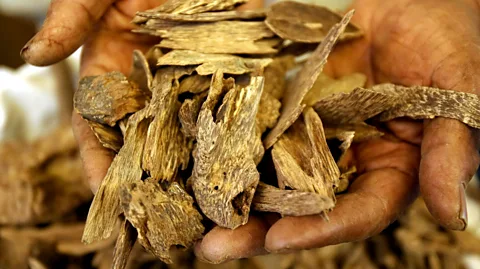 HASSAN AMMAR/AFP/Getty Images
HASSAN AMMAR/AFP/Getty ImagesHong Kong was once known as the fragrant harbour – the result of an ancient trade in agarwood.
The fragrance of thousands of incense sticks wafted through the narrow shopfront of the Wing Lee Joss Sticks & Sandalwood Company, a traditional family business in the Hong Kong neighbourhood of Yau Ma Tei. The walls were lined with bright gold-and-scarlet incense packs, but tucked away in glass cabinets was the most prized incense of all: agarwood.
The pungent, earthy scent of this wood gave Hong Kong its name, which, in Cantonese, translates as Fragrant Harbour. The scent is a poignant reminder of how this former colonial trading port, now a world financial hub, once played a pivotal role in the ancient incense trade to the Middle East and beyond.
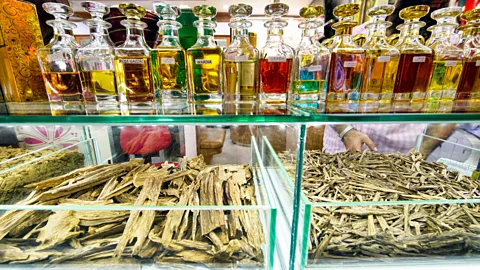
At 84, Yuen Wah has worked in the incense business for more than 70 years. His son Kenny, who now runs Wing Lee, has expanded the business into Mainland China, adding shops in Beijing, Shanghai and Harbin. Although he’s retired, Wah still visits his former shop on Shanghai Street.
“Agarwood was always an expensive timber,” Wah told me, recalling the time when he started work in the industry at 13 years old. “In the past, it was used in medicine as it was a very good painkiller. Now it’s gone from a medical use to being used as incense.”
Agarwood is created when Aquilaria trees, which were traditionally planted around villages for their Feng Shui properties, are damaged, allowing a mould to attack the timber. When harvested, the infected, dark, resinous wood is pared away from the healthy, scentless, cream-coloured wood.
 HASSAN AMMAR/AFP/Getty Images
HASSAN AMMAR/AFP/Getty ImagesAnd it’s this precious resin that has long been sought after. Known as the ‘King of Incense’, agarwood was extensively traded in the Middle East and Asia. Records from China’s Tang and Song Dynasties show it was a highly valued commodity, and its heady scent has historical connections stretching across Buddhism, Taoism, Islam and Christianity.
Today, smaller sections of agarwood resin are harvested for incense chips, selling for around HK$58,000 per kilogram in 2014. Larger logs, up to several metres in size, are sold as hand-carved sculptures – one shaped like the base and trunk of a tree in Wing Lee had a HK$1.2 million price tag. “These are like artworks,” Wah said.
The resin is especially coveted for its use in perfume and incense. Agarwood resin is distilled to create Oud oil, which is an essential ingredient in high-end perfumes such as Armani Privé’s Oud Royal and Yves Saint Laurent’s M7 Oud Absolu. Oud has been priced at nearly HK$300,000 per kilogram – it’s so expensive it’s often described as ‘liquid gold’.
But the huge demand for agarwood over the past few decades has resulted in Hong Kong’s Aquilaria species teetering on the threshold of extinction.
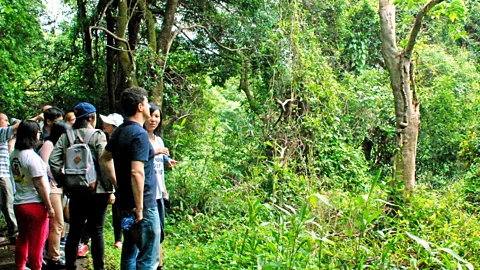 Ingrid Piper
Ingrid PiperAsia Plantation Capital (APC), one of Asia’s largest commercial Aquilaria growers, is trying to save the trees by encouraging sustainable agarwood plantations in Hong Kong and across Asia. They believe that only a few hundred wild specimens remain in Hong Kong, although the Hong Kong government claims to have planted around 10,000 saplings a year since 2009.
But simply planting saplings is no guarantee of survival as the trees take years to mature. And the current mature population is under even more threat due to poachers.
“Poachers look for older trees that are naturally infected, as they have more value, so these trees will increasingly be threatened,” said Gerard McGuirk, APC’s sales director in Hong Kong. “Now in Hong Kong, you’d be lucky to find a tree that’s 30 years of age.”
While the exact number of trees remaining in the wild may be in dispute, it’s clear that serious poaching is taking place.
Near the small village of Shing Ping, close to the border with Shenzhen, third-generation agarwood farmer Koon Wing Chan presides over a small plantation of around 6,000 trees. His is the only agarwood farmer in Hong Kong. And in an effort to sustain, preserve and market this endangered species, he has entered a joint venture with APC.
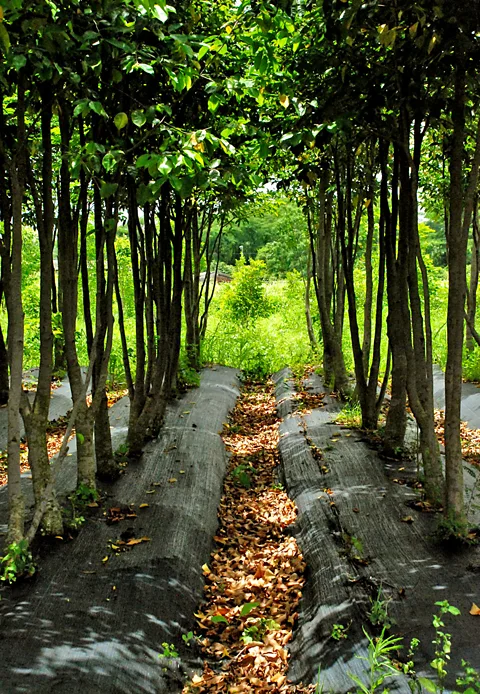 Ingrid Piper
Ingrid PiperTo highlight the plight of wild incense trees, APC offers guided tours of Chan’s farm and several public parks that are home to clusters of Aquilaria trees. Close to Chan’s plantation, in Pat Sin Len Country Park, the air is thick with the scent of agarwood emanating from trees that have been stripped to bare trunks. The work is crude, designed to damage rather than kill the tree.
“Not every tree will have resin, so thieves are gambling,” Wah said. In the wild, only 7% of trees produce resin.
In the steamy, mosquito-laden undergrowth of the park, the distinct odour is a sure sign that poachers will get some reward for a risk that could result in up to 10 years of jail time. Should they find the precious resin, poachers can earn significant amounts of money selling it on the black market.
Over the past two years, police and Agriculture, Fisheries and Conservation Department (AFCD) personnel carried out 35 anti-poaching operations in poaching hot spots such as Sai Kung, Lantau Island and northern parts of the New Territories. Now, AFCD plans to trial remote electronic monitoring of trees and closed-circuit television in Tai PO Kau Nature Reserve on the west coast of the territory, as well as growing more seedlings at its Tai Tong Nursery near Yuen Long.
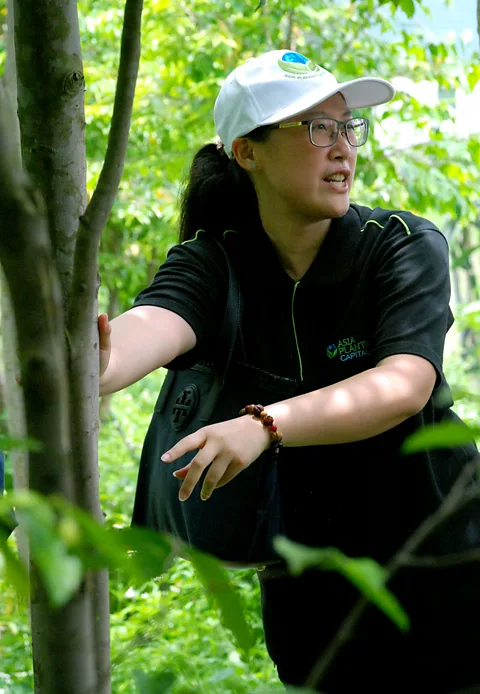 Ingrid Piper
Ingrid PiperPlanting more saplings in Hong Kong’s country parks seems unlikely to stop opportunistic poaching, but growing investor interest in environmentally sustainable Agarwood plantations could well save Hong Kong’s remaining incense trees from extinction.
“We have Agarwood plantations in five countries and we strongly believe in holistic sustainability, investing in the communities we operate in to create positive social impact,” Watts said.
“Our strategic partnership with Mr. Chan will help provide support and expertise required to develop long-term commercial opportunities in Hong Kong on a sustainable basis while also helping Mr. Chan produce Oud oil locally,” he said.
Join over three million BBC Travel fans by liking us on Facebook, or follow us on Twitter and Instagram.
If you liked this story, sign up for the weekly bbc.com features newsletter called "If You Only Read 6 Things This Week". A handpicked selection of stories from BBC Future, Earth, Culture, Capital, Travel and Autos, delivered to your inbox every Friday.
